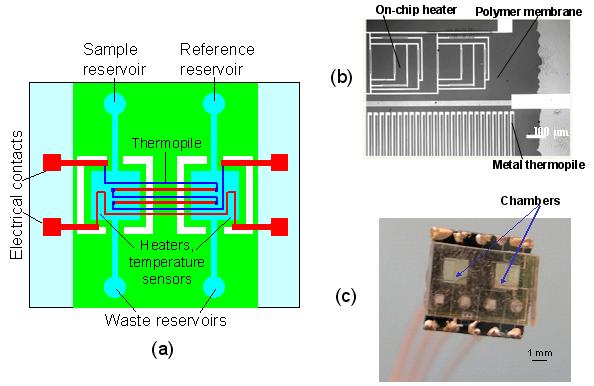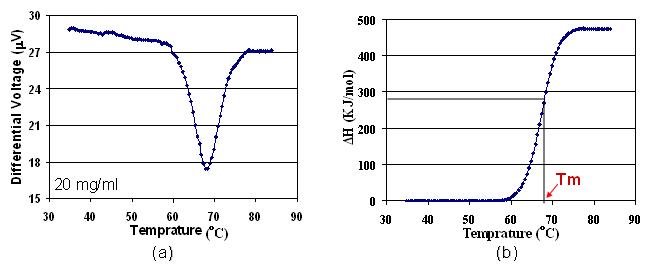| People | Research |
|
MEMS-based biocalorimetry
Calorimetry concerns the measurement of heat evolved in a biological or chemical process. Calorimetry has distinct advantages over other techniques for biomolecular characterization in that it is solution-based and label-free, and can be used for direct determination of thermodynamic properties of a wide variety of biomolecules as almost all reactions are thermally active. Conventional calorimetric instruments in general are rather complicated in construction and low in throughput, and require large amounts of biological material. To address these issues, we are developing MEMS biocalorimeters that, by integrating highly sensitive MEMS transducers with microfluidics for energetic characterization of biomolecules. For instance, we have developed a MEMS thermal biosensor that can sensitively detect biochemical reactions. Moreover, we have investigated differential scanning calorimetry (DSC), an important calorimetric method. In DSC measurements, heat from a biochemical reaction is obtained by monitoring the differential thermal activity between a biomolecular sample and a reference material in two matched calorimetric chambers whose temperatures are varied at a specified rate over a chosen range. Thus DSC can provide quantitative information about biomolecular thermodynamic properties over the temperature range. We have demonstrated a MEMS DSC device that integrates a highly sensitive thermopile (capable of resolving temperature differences on the order of ~20 K) as well as temperature control elements with microfluidic handling capabilities. The device has been successfully applied to the measurement of protein unfolding, yielding data that allowed determination of important thermodynamic parameters such as the enthalpy of unfolding and melting temperature of proteins.
 Images of (a) schematic of the device design, (b) the sensor chip with thermal components integrated on polymer diaphragms, and (c) packaged device.  Unfolding of lysozyme: (a) thermopile output voltage and (b) enthalpy change as the solution temperature is varied. These MEMS-based measurements allow determination of enthalpy of unfolding (474 kJ/mol) and melting temperature (Tm = 67.3 °C) that are consistent with data reported in the literature.
|